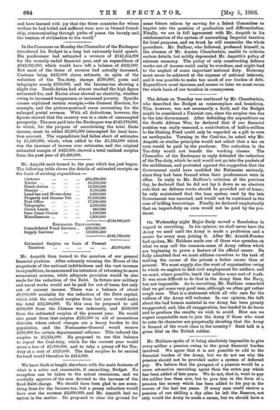We have dealt at length elsewhere with the main features
of what is a sober and reasonable, if unexciting, Budget. No exception can be taken to the actual remissions, and we cordially approve of the sum devoted to the increase of the fixed Debt charge. We should have been glad to see some- thing done for the Income-tax, but a penny reduction would have cost the revenue £2,600,000, and Mr. Asquith had no option in the matter. He proposed to clear the ground for
some future reform by moving for a Select Committee to inquire into the question of graduation and differentiation. Finally, we are in full -agreement with Mr. Asquith in his condemnation of the system of earmarking Imperial taxation for local purposes, and we trust he will reconsider the whole procedure. Mr. Balfour, who followed, professed himself, in the absence of Mr. Austen Chamberlain, unable to criticise certain details, but mildly deprecated Mr. Asquith's policy of extreme economy. The policy of only constructing defence works out of income could easily be overdone, and might lead to the neglect of some important national duty. Economy must never be achieved at the expense of national interests, and it was possible to make too much of our burden of debt. Expenditure must increase, and sooner or later we must revise the whole basis of our taxation in consequence.








































 Previous page
Previous page